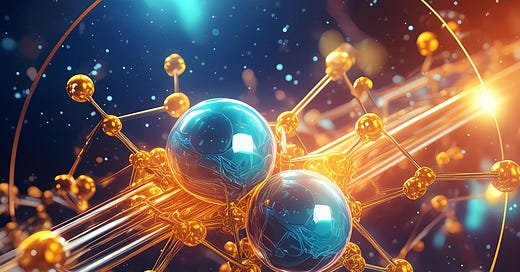Deuterium
TLDR - Deuterium is a heavy form of hydrogen. When we eat food, we ingest both the normal (lighter) and the heavier (deuterium) forms of hydrogen. Our bodies prefer the lighter form of hydrogen for biochemical processes. The amount of sunlight we receive on our skin significantly influences how much deuterium we can handle. If we consume foods high in deuterium and don't support our body's ability to manage it, deuterium can negatively impact our mitochondria and biochemical processes.
What is Deuterium?
Deuterium is one of the two stable isotopes of hydrogen, the other being protium. Unlike protium, which has just one proton, deuterium has one proton and one neutron, making it twice as heavy (often referred to as “heavy hydrogen”). This additional weight can affect biochemical processes in the body, potentially making reactions less efficient or requiring more energy to complete.
How Do We Get Deuterium?
Deuterium is present in both the food we eat and the water we drink. Its concentration can vary significantly depending on several factors, including geographical location and the type of food or water.
Water: The deuterium content in water varies based on its source. For example, water from tropical regions tends to have higher deuterium levels compared to water from polar regions. This is because the natural processes that fractionate deuterium are influenced by temperature and latitude.
Food: Similarly, the deuterium content in food varies based on where it is grown. Tropical fruits and vegetables generally have higher deuterium levels compared to those grown in temperate or polar regions. This is due to the higher deuterium content in the water used to grow these plants.
Foods and Waters High and Low in Deuterium
High Deuterium Foods:
Tropical fruits like bananas, pineapples, and mangoes
Vegetables grown in tropical regions
Processed foods and beverages, especially those high in carbohydrates
Low Deuterium Foods:
Foods grown in temperate or polar regions
Grass fed meats and wild caught fish
Leafy greens and root vegetables from cooler climates
High Deuterium Waters:
Tap water in tropical regions
Bottled waters sourced from tropical areas
Low Deuterium Waters:
Water from polar or high altitude regions
Certain brands of bottled water specifically marketed as low in deuterium
The Impact of Latitude on Deuterium Levels
The latitude of where produce is grown has a significant impact on its deuterium content. The closer a region is to the equator, the higher the deuterium levels in its water and produce. Conversely, regions further from the equator have lower deuterium levels. This geographical variation is due to the natural fractionation processes influenced by temperature and atmospheric conditions.
Sunlight's Impact on Deuterium
Sunlight plays a crucial role in how our bodies handle deuterium. Ultraviolet and infrared light from the sun help our bodies sequester and deplete deuterium. UV light can help deplete deuterium by breaking down water molecules, while IR light helps to sequester deuterium in the body's exclusion zone water, keeping it away from the mitochondria where it could cause harm.
This explains why people living in tropical regions, who are exposed to higher levels of sunlight year round, can handle higher deuterium levels in their food and water. Their bodies are naturally equipped to manage and mitigate the potential negative effects of deuterium.
Why Reducing Deuterium is Important for Mitochondrial Health
Mitochondria are the powerhouses of our cells, responsible for producing energy in the form of ATP. High levels of deuterium can disrupt mitochondrial function by interfering with the electron transport chain, leading to reduced energy production and increased oxidative stress. This can be problematic for individuals with mitochondrial dysfunction or chronic health conditions.
Reducing deuterium intake can help improve mitochondrial function and overall cellular health. This can be achieved by consuming low deuterium foods and water, and by spending more time in natural sunlight to help the body manage deuterium levels more effectively.
Lifestyle Thought
Are you consuming high deuterium foods and drinking high deuterium water in a location that gets little sunlight, or perhaps avoiding sunlight altogether? How might this be impacting your mitochondria and making your body work less efficiently, thereby negatively affecting your “body battery”?



